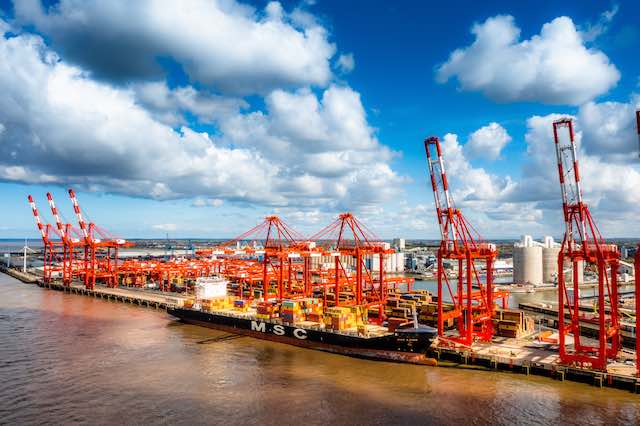
Leading discount brands, including TJ Morris, the parent company of Home Bargains, have called for shipping lines to adopt a new North/South, two-port UK strategy, advocating for the utilisation of both northern and southern ports for the delivery of deep-sea containerised cargo.
Despite 60% of these goods being destined for the north, historically, 90% of deep-sea containerised cargo enters the UK via southern ports. This discrepancy leads to a multitude of challenges, including inadequate rail and HGV driver capacity, congested roads, cargo delays, inefficient landside logistics, and heightened pollution from lengthy and unnecessary road journeys.
The proposed approach was discussed during a recent British Retail Consortium webinar, jointly hosted by Peel Ports Group, where retail leaders argued that reforming the current outdated model would enhance the efficiency of the country’s retail supply chain.
During the webinar, entitled The 60/90 dilemma – why sluggish UK retail supply chains are overdue a rethink, panelists, including TJ Morris Freight Manager John Cavanagh and Trinity Logistics Managing Director Amanda Unsworth, deliberated on how bringing the import of goods closer to their end destination would result in a more efficient, resilient, and sustainable retail supply chain.
The panel emphasised that implementing a two-port strategy would enhance operational efficiency for retailers, enabling them to be more responsive to customer demands and capitalise on market trends. They suggested that a North/South strategy would mitigate delays caused by adverse weather conditions or unforeseen incidents on road and rail networks.
The panel called upon shipping lines, the government, and port operators to collaborate in realising a two-port strategy.
Stephen Carr, Group Commercial Director at Peel Ports Group, said: “A North/South, two-port UK strategy could alleviate many of the country’s logistical challenges, revolutionising and modernising supply chains for retailers and other cargo owners.
“There is significant support from the retail sector, driven by the necessity to optimize the flow of seaborne cargo to achieve greater landside efficiencies.
“If we aspire to establish a supply chain that works in tandem with retailers, rather than against them, it is imperative to move away from the current status quo and leverage ports of entry in the north and across the nation.”
Peel Ports, the UK’s second-largest port operator, recently conducted a survey involving hundreds of UK retail leaders and cargo owners. More than three quarters of respondents (76%) expressed a desire to see goods imported closer to their end destination, with sustainability emerging as a primary goal for retailers. 77% of participants identified reducing carbon emissions as one of their top strategic priorities, while 79% believed that more efficient transportation of goods is necessary to mitigate greenhouse gas emissions.
John Cavanagh, Freight Manager at Home Bargains owner TJ Morris, commented: “A two-port strategy offers numerous benefits, including reduced transport costs, lower carbon emissions, and streamlined access to containers, enhancing our operational efficiency.
“The current system persists due to historical reasons, but our business ethos revolves around simplicity, and a two-port strategy enables us to respond to demand effectively, providing a tangible advantage.”
Amanda Unsworth, Managing Director of Trinity Logistics, added: “Bringing cargo destined for the north into southern ports poses various challenges. It is logical to bring goods closer to the end user, facilitating easier management and reducing the risk of delays, thereby enhancing our ability to respond promptly to evolving circumstances.
“We require senior leadership in our industry to commit to a two-port strategy. With such commitment, I am confident that it will gain traction and prove successful, as evidenced by past experiences. It is imperative that we collaborate to convey this message effectively.”
Stephen Carr concluded: “Leaders in the retail industry have voiced their support. They advocate for a multi-port import strategy to alleviate the strain on the supply chain upon which they heavily rely. The time has come for our industry to unite and expedite the implementation of a two-port strategy.”